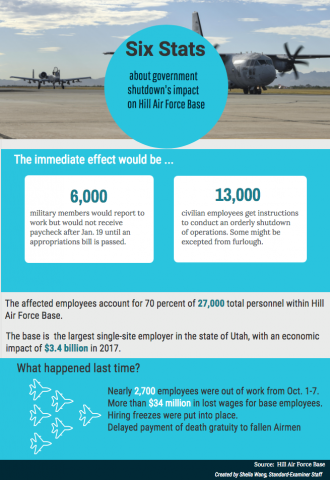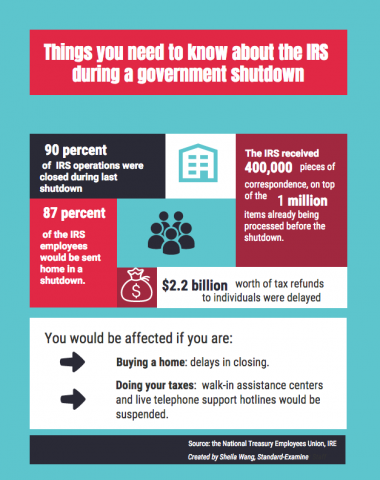Governor’s office statement on potential federal government shutdown
SALT LAKE CITY (Jan. 19, 2018) – Gov. Gary R. Herbert’s Deputy Chief of Staff Paul Edwards has issued the following statement in regard to a potential federal government shutdown:
We urge members of the United States Senate to resolve their differences and keep the federal government functioning. We also urge them to fund the Children’s Health Insurance Program, on which nearly 20,000 Utah children depend.
In the event of a federal government shutdown the State of Utah’s operations will continue as normal. State support will allow programs that operate in partnership with the federal government to function in the short term, even if federal funding is temporarily curtailed.
In contrast to Utah’s most recent experience with a federal government shutdown, this administration is working responsively with Utah to minimize local impacts.
For example, in the last government shutdown the Special Supplemental Nutrition Program for Women, Infants, and Children, known as WIC, was not authorized to spend any reserves and had to shut down. This administration would allow the State of Utah to use reserves to keep WIC functioning.
Additionally, we have every reason to believe that Utah’s National Parks will remain open, albeit with limited services. As in the past, the state of Utah would consider providing emergency funding to maintain appropriate access and safety in the National Parks throughout the duration of a shutdown.
Should there be any disruption accessing federal recreational opportunities in Utah, we remind visitors that Utah’s 43 state parks also offer incomparable outdoor experiences.
More information about what visitors to Utah could expect in the case of a shutdown can be found at visitutah.com/shutdown.
The largest state organization most directly affected by a federal government shutdown would be the Utah National Guard. Although the roughly 1,000 active duty guard members will ensure that critical functions continue, an additional 1,300 full-time employees who are not active duty, such as federally funded technicians, would be affected. Utah National Guard drills would have to be cancelled.
Although state operations are functional in the short term, a cessation of federal funding over an extended period of time could begin to affect some state operations.
While we don’t expect long-term economic dislocation because of a federal government shutdown, any Utahns who might become unemployed because of a shutdown can file for unemployment benefits with the Utah Department of Workforce Services.
--------------------------------------------
Secretary Perdue Outlines USDA Services in the Event of a Government Shutdown
(Washington, D.C., January 19, 2018) – U.S. Secretary of Agriculture Sonny Perdue today outlined U.S. Department of Agriculture (USDA) services available in the event of a government shutdown.
“USDA is committed to safeguarding life and property through the critical services we provide – and should the government shut down, we will continue to do just that," said Secretary Perdue. “I am proud of each USDA employee for everything they do to benefit the farmers, ranchers, foresters, and producers who depend on our services. It is their mission each day to fulfill our USDA motto, 'Do right and feed everyone.'”
While you may click HERE to view USDA’s lapse in funding plans, background information on USDA services available in the event of a government shutdown are below:
Food Safety and Inspection Service (FSIS):
In the event of a lapse in appropriation – among other duties listed HERE – FSIS will continue work to:
-
Ensure meat, poultry, and egg products are safe and prevent the movement or sale in commerce of any meat or poultry products which are adulterated;
-
Inspect before and after slaughter those birds and animals intended for use as food for humans and inspect the further processing of meat and poultry products;
-
Apply foreign governments’ inspection requirements and procedures to verify that products exported from the United States are safe;
-
Conduct emergency operations in connection with the voluntary recall of meat or poultry products determined to be adulterated or misbranded;
-
Conduct epidemiological investigations based on reports of food-borne health hazards and disease outbreaks;
-
Monitor allied industries to prevent uninspected, misbranded, or adulterated meat, poultry and egg products from illegally entering channels of commerce;
-
Provide pathological, microbiological, chemical, and other scientific examination of meat, poultry and egg products for disease, infection, contamination, or other types of adulteration;
-
Conduct a microbiological monitoring and surveillance program;
Animal Plant and Health Inspection Service (APHIS):
In the event of a lapse in appropriation – among other duties listed HERE – APHIS will ensure:
-
Imported products do not bring pests and diseases into the U.S.;
-
In the case of a pest or disease outbreak, the appropriate emergency personnel would come back to work immediately;
-
Overseas staff that provide for national security, including the conduct of foreign relations essential to the national security or the safety of life and property, are excepted;
-
Personnel from the APHIS Emergency Management, Safety and Security Division will respond as necessary to provide technical assistance and conduct investigations for excepted and exempt activities;
-
Animal Care will have staff on call to address issues related to licensed or registered facilities (such as immediate needs related to the care or treatment of animals; capture or containment of dangerous animals, or the required confiscation of animals);
-
Biotechnology Regulatory Services will monitor the compliance call line for incidents related to genetically engineered organisms. If an incident needs follow up, the correct regulatory and investigative personnel will be called in to work;
-
Security staff will be available on a case-by-case basis to respond to security incidents and to coordinate facility access;
-
Foreign animal disease (FAD) diagnosticians and incident command system (ICS) teams will be available on a case-by-case basis to respond to FAD investigations and FAD emergencies;
-
Laboratory personnel will be available to run tests on samples associated with foreign animal disease investigations, and, at the beginning of the period, to close out pending lab tests;
-
Staffing at National Wildlife Research Center and its associated field stations to care for the animals being studied.
Food and Nutrition Service (FNS):
In the event of a lapse in appropriations – among other duties listed HERE – FNS will ensure:
-
Ongoing activities include essential Federal functions to maintain the core programs of the nutrition safety net, including the Supplemental Nutrition Assistance Program (SNAP), the Child Nutrition Programs, and the Special Supplemental Nutrition Program for Women, Infants and Children (WIC);
-
All of these programs will continue to serve eligible people through USDA’s partners (State agencies and other grantees) utilizing legally available Federal resources previously provided to them or their own resources. All have funding available to operate through the month of February, and many have funds to continue operations through March, without additional appropriation.
-
Disaster feeding operations under the Food and Nutrition Act of 2008 and the Stafford Act would remain available based on the exception to fund functions critical to health and safety;
-
The smaller discretionary programs should utilize funds already allocated and made available for operation of programs. Food already purchased for delivery to the Food Distribution programs; The Emergency Food Assistance Program (TEFAP), the Food Distribution Program on Indian Reservations (FDPIR), USDA foods for Child Nutrition Programs, and the Commodity Supplemental Food Program (CSFP), will continue to be delivered to program operators.
Rural Development (RD):
In the event of a lapse in appropriation – among other duties listed HERE – RD will:
-
Continue its fiduciary responsibilities in accounting for and processing customers’ funds, such as loan escrow accounts, in an accurate and timely manner;
-
Ensure those individuals who hold single family housing loans from RD are able to make their monthly payments and will be held accountable to monthly mortgage payment deadlines;
-
Ensure organizations holding USDA Rural Development loans will still be able to make their payments and will be held accountable for making on-time loan payments;
-
Ensure Puerto Rico and Virgin Islands offices will continue to be open during a federal funding lapse to assist in continued disaster recovery efforts;
-
Staff at these offices will be able to conduct inspections of existing projects, and they will also be available to provide technical assistance to USDA customers.
Risk Management Agency (RMA):
In the event of a lapse in appropriations – among other duties listed HERE – RMA will ensure:
-
Crop insurance companies will continue to deliver and service the federal crop insurance program during a government shutdown;
-
Approved Insurance Providers (AIPS) will stay open and agents and loss adjustors will be fully available;
-
Indemnity payments will continue to be made.
U.S. Forest Service (USFS):
In the event of a lapse in appropriations – among other duties listed HERE – the USFS will continue work in:
-
Emergency and Defense Preparedness;
-
Fire Suppression including fire fighters and all necessary equipment costs to protect life and property, Law Enforcement personnel and all necessary equipment costs to protect life and property, and emergency and natural disasters response or preparation (e.g., floods and avalanche control);
-
Protection of Federal lands, buildings, waterways, equipment and other property and investments owned by the United States when the suspension of such activities would cause an imminent threat to human life and property. This includes nurseries, insectaries, tree seed labs, and the minimum level of staffing to administer permits and contracts needed for protection of National Forest System lands;
-
All contracts in support of cyber security, land-based radio communications, and infrastructure operations to support key positions and essential personnel;
-
Protection of Research studies where lack of continuation measurements or maintenance would destroy or endanger validity of research findings;
-
Job Corps operations unless directed otherwise by Department of Labor.
Agricultural Marketing Service (AMS):
In the event of a lapse in appropriation – among other duties listed HERE – the following services will remain available through AMS:
-
Commodity Procurement;
-
Grading and Inspection;
-
Cotton Classing;
-
Perishable Agricultural Commodities Act Program (PACA);
-
Research and Promotion Board Oversight;
-
FGIS: Inspection and Weighing Services (user fee funded activities);
-
Farm-Bill Funded Activities.
Economic Research Service (ERS):
In the event of a lapse in appropriations – among other duties listed HERE – ERS will:
-
Ensure coordination of data calls;
-
Maintain agency Local Area Network (LAN) and Wide Area Network (WAN) systems;
-
Ensure all systems remain online and functional;
-
Require COOP team staff for both readiness activities such as maintaining operable communications as well as implementation or activation activities, and to ensure adequate communication with the USDA OpsCenter.
National Resources Conservation Service (NRCS):
In the event of a lapse in appropriations – among other duties listed HERE – NRCS will continue their work in:
-
Puerto Rico and Virgin Island Activities;
-
Emergency Watershed Protection;
-
Dam monitoring.
Agricultural Research Service (ARS):
In the event of a lapse in appropriations – among other duties listed HERE – ARS will:
-
Continue performing duties related to preserving and protecting ARS facilities, animals and critical research infrastructure.
Foreign Agricultural Service (FAS):
In the event of a lapse in appropriations – among other duties listed HERE – FAS will:
-
Support NAFTA negotiations;
-
Engage on issues pending in the World Trade Organization;
-
Operate the Commodity Credit Corporation-funded Export Credit Guarantee Program (GSM-102);
-
Maintain international offices at U.S. embassies around the world.
Farm Service Agency (FSA):
In the event of a lapse in appropriations – among other duties listed HERE – FSA will ensure:
-
All FSA local service centers and farm loan programs in Puerto Rico and the U.S. Virgin Islands remain active.
Office of the Chief Economist (OCE):
In the event of a lapse in appropriation – among other duties listed HERE – OCE will continue Supporting:
-
The ongoing NAFTA negotiations;
-
The China negotiations in Geneva;
-
The OECD.

